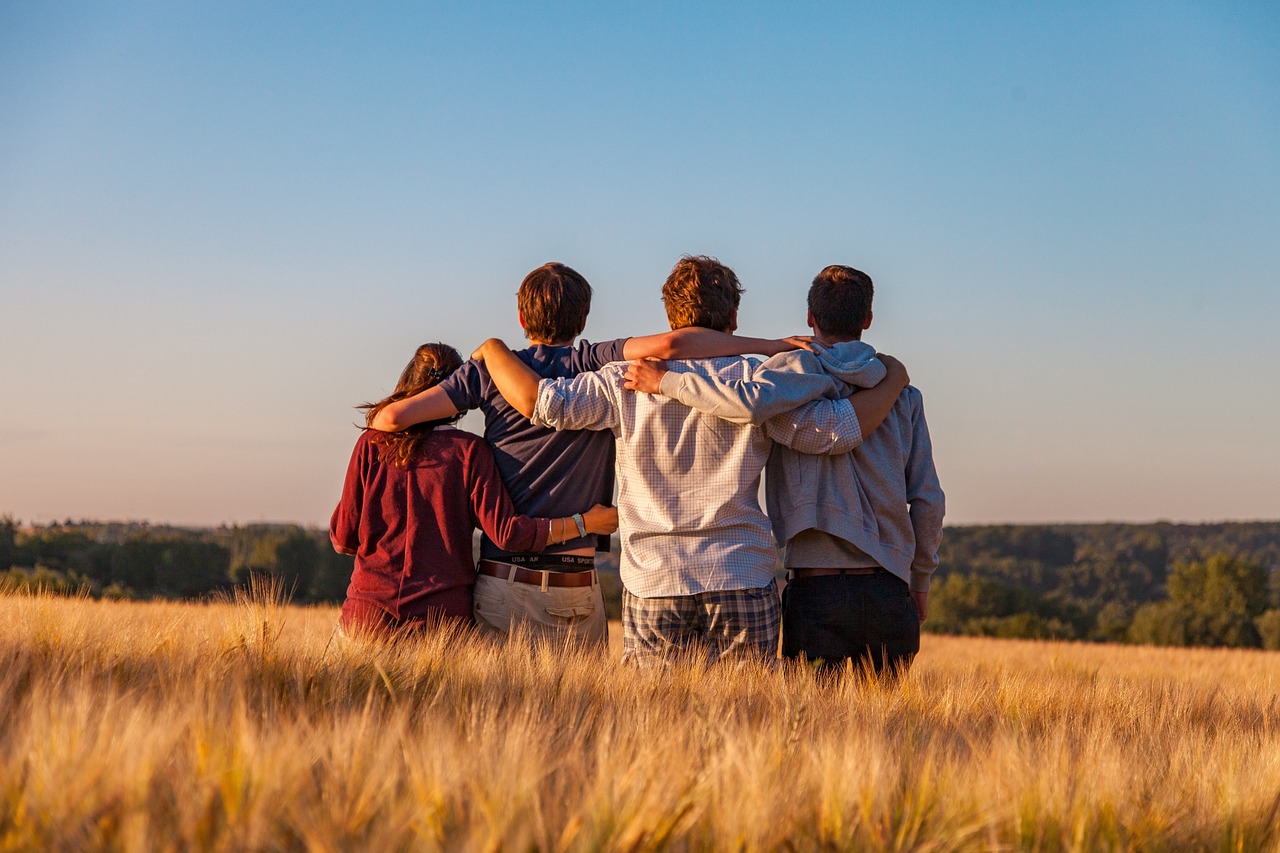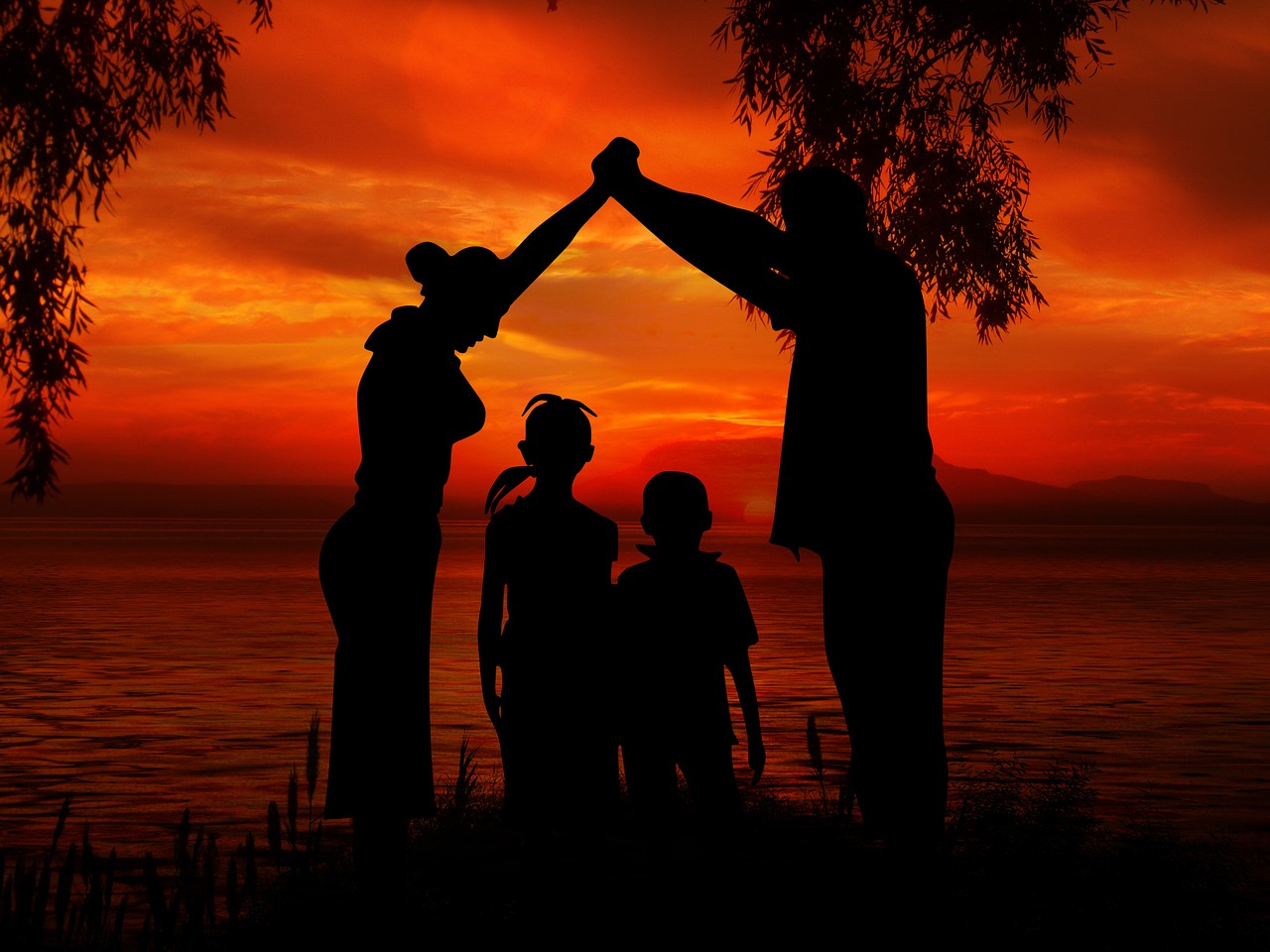Teens and Mental Health: A Parent's Resource for Support
"Explore valuable insights and tips on nurturing mental wellness for both parents and teenagers as we delve into the complexities of teen mental health."

February 01 2024
Teenagers are not adults yet!

They still need and crave your presence. Even when they refuse you, tell you to stop....Read more
They still need and crave your presence. Even when they refuse you, tell you to stop. They need to know (and feel) that you care. That you see them, that you hear them. Less lecturing and more eye-to-eye contact - a soft gaze that makes them feel loved and safe. Ask their opinions on things, hear their stories and appreciate when they share stories with you. The small things can open up the pathway to "bigger" and important conversations later on.And sometimes they only need you to sit closer and be silent with them.
Most families and teens I know, and have worked with, have a hard time keeping the closer connection once they become adolescents - most parents grieve the “end of childhood” when kids turn into teenagers, and most teens resent that their parents don’t “get them” or they feel pressured to become adults (work, make money, take care of siblings, get lots of extra curricular activities for college prep and so on).
Your adolescent still needs and craves your attention, presence, patience and care. They need to feel relaxed in your presence. Not judged, labeled or feeling like a burden. I have had many teenagers bringing up their constant feeling of being a burden to their parents, or not even feeling safe to share their thoughts and experiences fearing a punishment, or being judged, shamed.
They are not adults, no matter how much you want them to “mature”, so check your expectations on them too. For many decades, society had a view on adolescence as this "limbo" period of time: they are not kids, and they are not adults! So what do we do?
Now, thanks to new discoveries in brain science, neurobiology findings of the teen's brain, we know that they are going through a very intense brain rewiring process, pruning and creating an enormous amount of new neurons and pathways. They have a high-intense emotional brain (limbic system is in full force) and lack the mastery of abilities such as planning, critical thinking, emotional and impulse control, to name a few - as the prefrontal cortex is still developing.
The interesting part is that, as parents of teens, we also grieve not having a baby on our lap and telling how much they love us, following our directions, wearing what we set aside. We miss the baby times, the cuteness and feeling like they need us. Then suddenly, a teenager is there , right in front of you, and many parents have no clue how to connect with. They are more independent, they push you away when you try to "baby them". So you feel lost. You start seeing them as mini-adults, creating unrealistic expectations, and parenting based on your pain, or your experience growing up.
And during all that disconnection, you are missing out on getting to discover a phenomenal child right in front of you: your teenager! I know teens have a stigma in our society of being difficult. I have one teenager at home. They can be moody, dramatic, “know-it-alls”. The more I learn about teens, the more I am in awe of them. They are incredibly creative, risk takers, energetic, resilient and emotional beings that can pour their hearts into anything they feel connected to.
Get to know them again. Ask opinions, share stories, hug and kiss them too - always respecting their privacy and sensory preferences, of course. Invite them out for their favorite meal or drinks (of course I am not suggesting alcohol!). Be ready to listen without trying to "fix" anything. Just listen to them. Be curious, and make sure to show your presence often and unconditionally.
I hope that you, just like me, start to see your teen as this wonderful person learning about life and the world. I hope that you, just like me, start to enjoy having your teen closer to you, to get to know them more. I hope that you, just like me, start to fall in love with your teen today!
Not only the love from parents we expect, but get to know them for who they are now, so you can confidently tell them:
“I love you and I really really like who you are”
Lets map. I can help!
Flavia Nazareth - is a mom of a teen, an Art Therapy Practitioner, Certified Parent Coach, Teen Coach Specialist and trauma-informed coach for teens and adults. She has trainings and certifications in youth anxiety and depression, including child's grief and loss. She is the founder and owner of Little Blank Canvas Art Studio and MAP - Mindful Art Practices/Mindful Art of Parenting.Flavia was born in Rio de Janeiro, Brazil and lives with her husband, daughter and her adorable dog Sparky in North Carolina, USA. When she is not at the Art Studio or working at MAP, she is traveling, reading, or hanging out with her daughter Olivia. To learn more about Flavia and her work at MAP, click here or email her at Mindfulartpractices@gmail.com and check out her Parent Coach page
January 12 2024
Yelling says more about us than about our children.

I know. We have all been there. The building up of frustration....Read more
We are late to work, school or events. It is bedtime and your precious child is thirsty, or needs to use the bathroom AGAIN. Monsters under the bed, or they just want to tell you for the 100th time all about their day. It doesn't matter the reason, all parents have been there. And most are still in the routine of yelling. ALL THE TIME.
I hear a lot of parents justifying their yelling as "the only way my kids listen to me", or " They make me yell", or even the classic "they need to know who the boss is".
For me, it was the way I was raised. It was my stress level that I was not yet managing the way I could. It was my dissatisfaction with my life, the constant rushing and lack of personal satisfaction. And on top of it, I had NO IDEA HOW TO STOP YELLING!
Until I started to learn about my own triggers and lack of emotional control, and what chronic, toxic high stress does to your brain and body, specially in children and teens.
Do you know that yelling affects the same area of the brain as being in danger, under threat?
Simply put, being yelled at increases the activity of the amygdala, a part of the brain that monitors signs of danger and threat. Our fight , flight and freeze response. Studies show that an overactive amygdala - in constant, toxic stress - plays a significant role in developing depression later on in life.
Not only that, exposure to frequent yelling (or any sign of threat and danger) in childhood can cause us to interpret ourselves and the world negatively. The region in our brain that functions as a monitoring area (the amygdala) plays the role of observing the environment and detecting situations of risk, getting activated every time it recognizes a threat. An environment with yelling, threats, blame, shame and/or contempt automatically puts our brain on high alert, increasing the production of stress hormones, such as cortisol. Overtime, that constant cortisol induced by chronic/toxic stress, can affect many functions and behaviors, such as: decreased in learning and attention, increased anxiety and aggression, as well as difficulty in socialization and focus.
In reality, yelling says more about our lack of emotional education and understanding of child behavior than about what our children are doing. When adults are faced with stress, lack of proper sleep, among many different causes of nervous system dysregulation (childhood trauma, adverse experiences etc.), the fight/flight/freeze response can get triggered easily, resulting in reactions such as yelling, corporal punishment, threatening, bribing, just to name a few.
According to multiple studies, including one titled "Harsh Verbal Discipline' and Adolescents’ Conduct Problems and Depressive Symptom" (see study here), yelling not only affects "poor school achievements, behavioral problems...and delinquent behaviors", but has a similar effect on children as physical punishment, even changing the way a child's brain develops (read full study here).
In order to help our children develop their abilities and appropriate emotional intelligence, yelling, threats, and contempt should be the exception in your family, not the rule in parenting.
Easier said than done. I know. As we start to understand brain science, we learn that when in Danger Response (fight/flight/freeze/collapse) our "thinking brain" gets offline - and we lose the ability to learn, control emotions, focus and creative problem solving. In reality, when using punishments, hitting and yelling, parents are creating an environment opposite to learning: survival kicks in and executive skills get disconnected.
The sense of unsafety blocks our ability to feel, think and learn. And when this environment becomes the norm, children tend to become hypervigilant, anxious, lacking focus and concentration. Depending on how high the stress is and how frequent this state is, dissociation/depression/disconnection can become the next response, also manifesting as lack of motivation, inattention.
In addition to that, children also learn by mimicking behaviors: Mirror Neurons, simply put, are activated both when we perform an action and when we observe someone else performing the same action, creating a neural mirroring effect (hence the name), allowing us to mentally simulate the experiences, emotions, and intentions of others: capacity for imitation, social learning, and empathic responses.
"Children have a hard time learning to regulate their own emotions if their parents don't show them how," says Laura Markham, Ph.D., and clinical psychologist. According to Dr. Markham, parents with a tendency to constant yelling end up teaching their children to respond the same way when facing frustrating situations of their own. Anger begets anger, yellers raise yellers.
That is the main reason why we, adults, need to be intentional on how to model our behaviors and connect with our kids. Especially when under emotional distress (anger, sadness, fear etc.). And it is through our internal work that we can create a healthy family environment for our children and future generations.
The work starts with us, the adults. And this is even more important if your children are already entering, or already are in, adolescence.
The best part of all this knowledge, brain science discoveries and neurobiology of trauma, is that THERE IS HOPE.
My personal transformation had a direct impact on my relationship with my daughter. I had to start working on myself. I am not a perfect parent. She is not a perfect teen. Nope. But we are a team now. I am mindful of my own internal landscape. My own emotional experience. At least most of the time. And I see her, who she is, her needs. I listen to her more often. I feel more present in our lives. I try to fix her "problems” less, and be present and silent (sooooo challenging to me and yet so liberating!!) more.
And I became fascinated by tweens and teens. I discovered that, in my path to helping our relationship and supporting her, I was healing and becoming a better version of me.
You have that power too. To be the parent your children deserve today, and the role models they will become for their own children and future generations.
The impact we have in future generations is one of the coolest benefits of all this new step in my parenting mindset - and one big motivation for my new career as a Parent Coach.
Stopping with the constant yelling is now one step closer to you as it was before you read this article. So, what is blocking you from becoming the parent you want to be?
Flavia Nazareth - is a mom of a teen, an art therapy Practitioner, Jai Certified Parent Coach and trauma-informed coach for teens and adults. She is the founder and owner of Little Blank Canvas Art Studio and MAP - Mindful Art Practices/Mindful Art of Parenting.
Flavia lives with her husband, daughter and her adorable dog Sparky in North Carolina. When she is not at the Art Studio or working at MAP, she is traveling, reading, or hanging out with her daughter Olivia. To learn more about Flavia and her work at MAP, click here or email her at Mindfulartpractices@gmail.com and check out her Parent Coach page teenagers
January 07 2024
The profound impact of love versus fear in raising children

"When a child is not treated in love but in fear, she/he/they will learn not to self-love, but to Self Defend"...Read more
"When a child is not treated in love but in fear, she/he/they will learn not to self-love, but to Self Defend"
The quote from Dr. Françoise Dolto is a powerful reminder of the fundamental choice parents, caregivers, and society as a whole must make when it comes to raising the next generation. Simply put: the way children are treated significantly influences their development and well-being. It offers a binary choice between two contrasting approaches: love and fear.
It involves being mindful of our choices in creating an environment in which a child feels safe, seen, felt, valued, and cherished, fostering open communication, trust, and emotional security.
Even knowing the “cause-effect” relationship, we (parents/caregivers/educators) are so hurt that we still believe we should be punishing, threatening, blaming and shaming our kids to teach them skills, to get their "obedience" and respect. Instead of loving them, respecting their nature and developmental stage, we label, create unrealistic expectations and are unable to see them where they are in their learning process, and who they are as individuals.
We have normalized the use of these "disciplinarian tools" that we don't even recognize them as abuse: treating a child in fear involves using intimidation, punishment, blame/shame and strict discipline as primary tools for parenting. According to extensive studies, children subjected to fear-based parenting may grow up with anxiety, low self-esteem, and difficulty forming healthy relationships, leading to a cycle of negative behaviors and emotional turmoil.
We are the only species not aware of what our own baby-species need to thrive. Our nature has been so damaged that we still believe that surviving is the same as thriving, "doing" and "having" is more important than "being", and that children need to be hurt and in fear to learn and show "respect".We are so hurt and dysregulated that we expect children and teens to be mini-adults; however, we would not treat an adult the same way we treat kids. Paradoxical much?
Would you hit your best friend if she/he/they spills milk on your sofa? Would you yell at your co-worker if they make a mistake? Would you take away your partners smartphone to teach him/her/they a lesson?
When a child is treated with fear, the consequences can be deeply detrimental. Here's a glimpse of the potential outcomes:
Anxiety and Stress: Fear-based parenting can lead to chronic stress and anxiety, as children constantly worry about the consequences of their actions.
Low Self-Esteem: Fear can erode a child's self-esteem, leading to self-doubt and feelings of inadequacy.
Rebellion and Aggression: Children raised in fear may rebel against authority figures or develop aggressive behavior as a means of self-defense.
Trust Issues: Fear-based parenting can create a sense of distrust and an inability to form close, meaningful relationships.
We are so hurt that we still believe acts of "abuse" are effective ways in showing love, teaching a lesson and/or demanding respect.
We are so hurt that we are not capable to see a different way to parent other than yelling, threatening, demanding and punishing.
What if I can promise you and show you that there is a way to connect with your kids and teens that does not include punishments, rewards and “obedience”?What if we can tap into our instinctual nurturing-loving beings and teach from the heart not from HURT? A way of bringing back our humanity and a deeper understanding about our own species.
When a child is treated with love, acceptance and respect, the impact is far-reaching and overwhelmingly positive:
Emotional Well-being: Love provides a stable emotional foundation that allows children to explore their feelings and develop emotional intelligence.
Self-Esteem: A loving environment bolsters a child's self-esteem and self-worth, enabling them to face challenges with confidence.
Healthy Relationships: Children raised in love tend to form healthier, more fulfilling relationships in adulthood, as they've learned to trust and communicate effectively.
Empathy and Compassion: Love teaches children empathy and compassion, nurturing their ability to understand and connect with others.
The quote "If a child is not treated in love but in fear" encapsulates the profound impact of parenting choices on a child's life. Love and fear representing two contrasting paths.
The transformational power of love in child rearing cannot be understated, and by choosing love over fear, we contribute to the betterment of the next generation and the world they will shape. Let us embrace this wisdom and create a nurturing environment where love guides our children's growth and development.
Let’s be the ones breaking the generational cycle of superiority and patterns of oppression and power. By doing so, we can live a more fulfilling life without suffering the consequences of trauma, violence and mental disorders in our society, so our kids do not have to recover from their childhoods.
I know deep down you feel lost. And I know how it feels to not know where to turn for answers." How do I parent differently then?"
I promise you that there is a road-map. A path that is healing for you and your family.
Are you ready to transform the way you live and parent?
It is transformative. It is possible. There is hope.
Let’s map. I can help.
Flavia Nazareth - is a mom of a teen, an art therapy Practitioner, Jai Certified Parent Coach and trauma-informed coach for teens and adults. She is the founder and owner of Little Blank Canvas Art Studio and MAP - Mindful Art Practices/Mindful Art of Parenting.
Flavia lives with her husband, daughter and her adorable dog Sparky in North Carolina. When she is not at the Art Studio or working at MAP, she is traveling, reading, or hanging out with her daughter Olivia. To learn more about Flavia and her work at MAP, click here or email her at Mindfulartpractices@gmail.com and check out her Parent Coach page
December 30 2024
New Year, Fresh Start!

I believe that every journey begins with an intention...Read more
Unlike resolutions, intentions are soft, qualitative, and compassionate. They embody a certain quality felt in the body before reaching the thinking brain. Intentions aren't easily measured; they embrace energy and sensation more than the physical, measurable aspect of a goal or resolution.
Where we direct our focus, energy follows.
As we initiate the year with intentions, here are some of my favorite tools for a fresh start:
Setting Intentions: Rather than jotting down goals and resolutions, reflect on the past year. Consider Ariana Huffington's wise words: "we can have it all, but not at the same time." Focus on specific areas like family, career, mental health, or new projects. Choose no more than three areas to mindfully set intentions for the coming year—soft aspects to be aware of in your new cycle.
Personally, I'm placing attention on my physical health as I approach my 49th birthday, aiming for more energy and vitality. Acknowledging the importance of self-care, I'm dispelling limiting beliefs and understanding my resistance. Simultaneously, I plan to transition from LBC to MAP, organizing my schedule to extend my impact globally.
What areas do you intend to focus on in 2024?
Practicing Gratitude: Shift your mindset by practicing gratitude. Beyond listing life's positives, feel the sensations and emotions of gratitude. Reflect on the past year, listing everything you're grateful for—consider writing or drawing on paper for a more meaningful experience. Focus on three things to get started. I'm grateful for my creative community, my health, and my family. The simple pleasures, like a warm nightly bath, clean sheets, my dog, and moments in nature, bring immense gratitude. Make this a family activity, especially powerful with tweens/teens at home.
Be Silly: Life is meant to be enjoyed; don't take it too seriously. Create moments for fun and enjoyment in your busy life. Try Family Dance Parties—let each family member be in charge of the playlist or create a "silly dance" playlist together. Sing, move, and laugh; the sillier, the more in tune with yourself.
Hugs: Prescribe yourself hugs; they're a powerful tool. Hugs release happiness hormones, lowering stress and promoting a sense of safety. If physical contact isn't your preference, consider other forms like holding hands, therapeutic massages, or self-hugging. Embrace the opportunity for self-love and self-compassion.
Nutrition, Sleep, Exercise, Time in Nature: While we know the importance of these aspects, common sense often eludes common practice. Small, consistent steps make a significant impact. Remember Mel Robbins' mantra: "I don't feel like it, but I am doing it anyway." Embrace changes gradually; during the pandemic, I stopped drinking alcohol for better immunity and felt the positive effects after some initial resistance.
Smile: Put on a Mona Lisa-style smile; even a fake or posed smile can alter your emotions. "Fake it until you make it" holds truth, as demonstrated by a global collaboration led by Stanford University researchers.
Welcoming the New Year: Be patient and gentle with yourself as you transition into a new phase. The aim isn't perfection but a gentle expansion of your comfort zone. Replace the idea of self-care with fostering a loving relationship with yourself.
In summary, have fun, be silly, dance, hug, and don't forget to smile!Flavia Nazareth - is a mom of a teen, an art therapy Practitioner, Jai Certified Parent Coach and trauma-informed coach for teens and adults. She has trainings and certifications in youth anxiety and depression, including child's grief and loss. She is the founder and owner of Little Blank Canvas Art Studio and MAP - Mindful Art Practices/Mindful Art of Parenting.
Flavia lives with her husband, daughter and her adorable dog Sparky in North Carolina. When she is not at the Art Studio or working at MAP, she is traveling, reading, or hanging out with her daughter Olivia. To learn more about Flavia and her work at MAP, click here or email her at Mindfulartpractices@gmail.com and check out her Parent Coach page
Contact
Phone: 336-848-3326
DISCLAIMER:
The aim and mission of my work at MAP are to provide support, care, guidance, and assistance to families, teens, and children, drawing from my life experience as a mom, child educator, art therapy practitioner, Parent and Teen Coach, as well as the Certifications and training I have acquired along my journey. I operate as a specialist, mentor/coach in a non-medical/non-diagnostic capacity and do not hold a license as a psychotherapist or Counselor. My role is to offer supportive guidance to facilitate positive changes in people's lives. It's important to note that my work is not intended for diagnosing, treating, or curing any mental health or medical conditions. It should not be regarded as a substitute for psychological counseling, psychotherapy, mental health counseling, or any other form of psychotherapy or medical advice.
